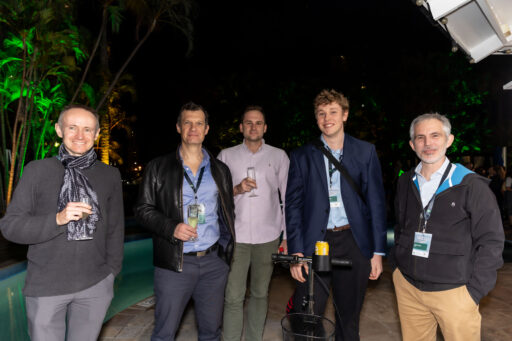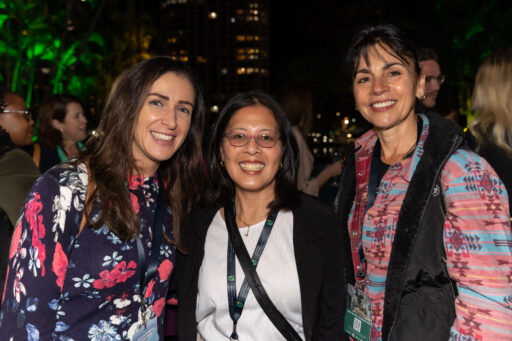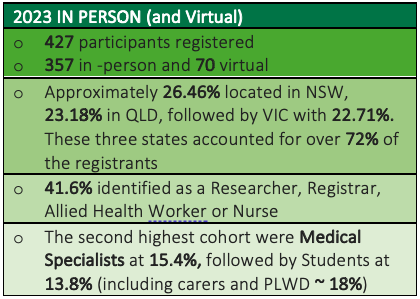
The Australian Dementia Research Forum 2023 (ADRF) provided us with a remarkable platform to share knowledge, exchange ideas, and foster collaborations that will undoubtedly shape the new era for dementia diagnostics, treatment, management, and care in Australia.
Over the course of the Forum, we deepened our understanding on the “what, when and why” of Alzheimer’s disease. Dr Nick Ashton delivered an excellent talk about detecting AD pathology in blood and its applications for therapeutic trials and clinical implementation. We learned from Associate Professor Michelle Lupton how genetic risk factors can be used to predict Alzheimer’s in those with increased susceptibility to the disease. We discussed at length about tackling A𝛃 plaques and tau in the brain, and Professor Christian Behl emphasised how we can increase neuronal resistance by targeting autophagy to counter neurodegeneration. These highlighted the important role of discovery research in dementia.
Compelling evidence and research was shared that emphasises the importance of prevention and adopting modifiable risk factors that have the potential to significantly delay the onset and prevalence of dementia. Professors Sharon Naismith and Colin Masters reminded us of the importance of sleep in clearing neurotoxins and how providing interventions that target sleep could be critical in dementia prevention. Associate Professor Kerryn Pike walked us through cognitive training strategies that they use in Latch, and Professor Henry Brodaty showed us the results of addressing several modifiable risks through the Maintain Your Brain program.
We had an insightful panel discussion and a very engaging debate on dementia detection and management in primary care. Special thanks to our debaters – Dr Stephanie Daly and Associate Professor Michael Woodward for driving home the message of the need for and importance of collaboration between primary and secondary care for early detection and management of dementia. We learned from Dr Heather Snyder on how this is done in the US.

We were delighted to learn about SVEDEM from Professor Maria Eriksdotter, particularly the universal enrolment of dementia patients from different settings, showing us the invaluable insights derived from a clinical quality registry. We are quite proud of our work on the ADNeT Registry having learned from SVEDEM. Congratulations to the ADNeT Registry Team led by Dr Stephanie Ward, Professors Henry Brodaty and Susannah Ahern for their great work and launching our second annual report during the Forum. As disease modifying therapies are approved, the ADNeT Registry is well placed to monitor appropriate use, safety and efficacy of treatment. We continue to collaborate with our international counterparts in ALZNET on this, as mentioned by Dr Heather Snyder from Alzheimer’s Association.
We thank all the researchers who participated in the Symposia, the Great Debate, the panel discussion and submitted their work through oral presentations and posters. We also thank our Special Interest Groups who presented on Day 1 of the Forum. It is apparent that we are in very capable hands for future dementia research in Australia.
We thank our Gold Sponsor Dementia Australia, our Silver Sponsors the CSIRO, Novo Nordisk, Eisai and all of the sponsors whose essential support allowed us to deliver the Australian Dementia Research Forum 2023. Many thanks to Actinogen for the poolside networking drinks – we were delighted to partner with an Australian biotech company.



With the promising new blood-based biomarkers test, faster, accurate and cost-effective assessment of Alzheimer’s disease is within reach. Even more exciting are the new disease modifying therapies coming to Australia in the next few years. As we reflect on the insights and knowledge gained over the ADRF 2023 we are encouraged to continue the conversations and connections that were sparked there. Let us carry forward the spirit of collaboration and inquiry and collaboratively work together to turn the tide in this new era for dementia.

The core program for the 2023 in-person forum, held on the Gold Coast, consisted of 427 registrations, 31 sessions, 69 speakers, 21 hours of content and 100 posters on display.
Positive feedback was received regarding the Keynotes, The Great Debate and Panel Discussion with the Government Department of Health, as well as suggestions for future topics and improvements to the forum.